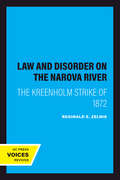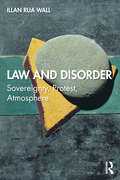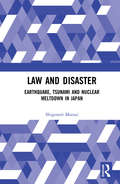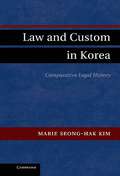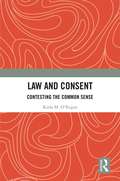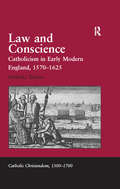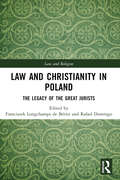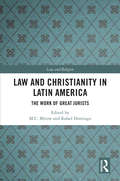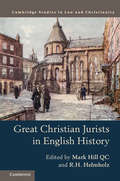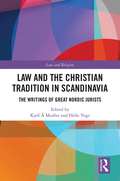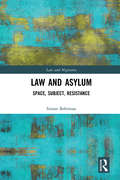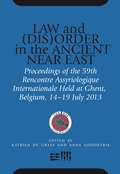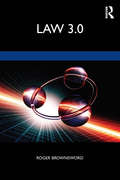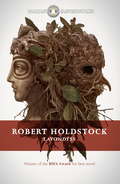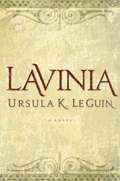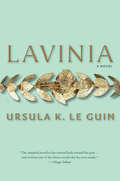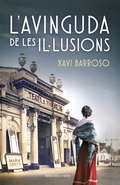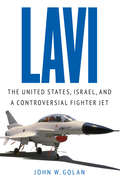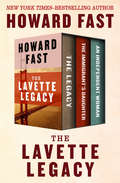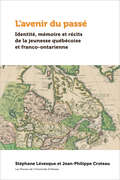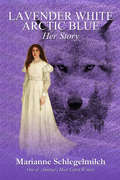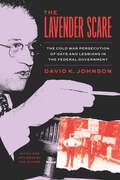- Table View
- List View
Law and Disorder on the Narova River: The Kreenholm Strike of 1872
by Reginald E. ZelnikReginald Zelnik uses a single episode—a militant strike at the Kreenholm factory, Europe's largest textile plant—to explore the broad historical moment. In examining this crucial event of Russian history he sheds fresh light on local power relations, high politics in St. Petersburg, controversies over the rule of law, and the origins of the Russian labor movement. Zelnik sees this pivotal moment in Russian labor history as the beginning step in the series of conflicts that eventually led to the upheavals of the early twentieth century.
Law and Disorder: Sovereignty, Protest, Atmosphere
by Illan rua WallFocusing on the moment when social unrest takes hold of a populace, Law and Disorder offers a new account of sovereignty with an affective theory of public order and protest. In a state of unrest, the affective architecture of the sovereign order begins to crumble. The everyday peace and calm of public space is shattered as sovereign peace is challenged. In response, the state unleashes the full force of its exceptionality, and the violence of public order policing is deployed to restore the affects and atmospheres of habitual social relations. This book is a work of contemporary critical legal theory. It develops an affective theory of sovereign orders by focusing on the government of affective life and popular encounters with sovereignty. The chapters explore public order as a key articulation between sovereignty and government. In particular, policing of public order is exposed as a contemporary mode of exceptionality cast in the fires of colonial subjection. The state of unrest helps us see the ordinary affects of the sovereign order, but it also points to crowds as the essential component in the production of unrest. The atmospheres produced by crowds seep out from the squares and parks of occupation, settling on cities and states. In these new atmospheres, new possibilities of political and social organisation begin to appear. In short, crowds create the affective condition in which the settlement at the heart of the sovereign order can be revisited. This text thus develops a theory of sovereignty which places protest at its heart, and a theory of protest which starts from the affective valence of crowds. This book’s examination of the relationship between sovereignty and protest is of considerable interest to readers in law, politics and cultural studies, as well as to more general readers interested in contemporary forms of political resistance.
Law and Disaster: Earthquake, Tsunami and Nuclear Meltdown in Japan
by Shigenori MatsuiOn the 11th of March 2011, an earthquake registering 9.0 on the Richter scale (the most powerful to ever strike Japan) hit the Tohoku region in northern Japan. The earthquake produced a devastating tsunami that wiped out coastal cities and towns, leaving 18,561 people dead or registered as missing. Due to the disaster, the capability of the Fukushima Nuclear Power Plant, operated by Tokyo Electric Power Company (TEPCO), was compromised, causing nuclear meltdown. The hydrogen blast destroyed the facilities, resulting in a spread of radioactive materials, and, subsequently, serious nuclear contamination. This combined event – earthquake, tsunami, and nuclear meltdown – became known as the Great East Japan Earthquake Disaster. This book examines the response of the Japanese government to the disaster, and its attempts to answer the legal questions posed by the combination of earthquake, tsunami, and nuclear meltdown. Japanese law, policy, and infrastructure were insufficiently prepared for these disasters, and the country’s weaknesses were brutally exposed. This book analyses these failings, and discusses what Japan, and other countries, can learn from these events.
Law and Custom in Korea
by Marie Seong-Hak KimThis book sets forth the evolution of Korea's law and legal system from the Chosǒn dynasty through the colonial and postcolonial modern periods. This is the first book in English that comprehensively studies Korean legal history in comparison with European legal history, with particular emphasis on customary law. Korea's passage to Romano-German civil law under Japanese rule marked a drastic departure from its indigenous legal tradition. The transplantation of modern civil law in Korea was facilitated by Japanese colonial jurists who themselves created a Korean customary law; this constructed customary law served as an intermediary regime between tradition and the demands of modern law. The transformation of Korean law by the brisk forces of Westernization points to new interpretations of colonial history and it presents an intriguing case for investigating the spread of law on the global level. In-depth discussions of French customary law and Japanese legal history in this book provide a solid conceptual framework suitable for comparing European and East Asian legal traditions.
Law and Consent: Contesting the Common Sense
by Karla M. O'ReganConsent is used in many different social and legal contexts with the pervasive understanding that it is, and has always been, about autonomy – but has it? Beginning with an overview of consent’s role in law today, this book investigates the doctrine’s inseparable association with personal autonomy and its effect in producing both idealised and demonised forms of personhood and agency. This prompts a search for alternative understandings of consent. Through an exploration of sexual offences in Antiquity, medical practice in the Middle Ages, and the regulation of bodily harm on the present-day sports field, this book demonstrates that, in contrast to its common sense story of autonomy, consent more often operates as an act of submission than as a form of personal freedom or agency. The book explores the implications of this counter-narrative for the law’s contemporary uses of consent, arguing that the kind of freedom consent is meant to enact might be foreclosed by the very frame in which we think about autonomy itself. This book will be of interest to scholars of many aspects of law, history, and feminism as well as students of criminal law, bioethics, and political theory.
Law and Conscience: Catholicism in Early Modern England, 1570–1625 (Catholic Christendom, 1300-1700)
by Stefania TutinoThis book examines the Catholic elaboration on the relationship between state and Church in late Elizabethan and Jacobean England. Among the several factors which have contributed to the complex process of state-formation in early modern Europe, religious affiliation has certainly been one of the most important, if not the most important. Within the European context of the consolidation of both the nation-state entities and the state-Churches, Catholicism in England in the 16th and 17th centuries presents peculiar elements which are crucial to understanding the problems at stake, from both a political and a religious point of view. Catholics in early modern England were certainly a minority, but a minority of an interestingly doubled kind. On the one hand, they were a "sect" among many others. On the other hand, Catholicism was a "universal", catholic religion, in a country in which the sovereign was the head - or governor - of both political and ecclesiastical establishments. In this context, this monograph casts light on the mechanisms through which a distinctive religious minority was able to adapt itself within a singular political context. In the most general terms, this book contributes to the significant question of how different religious affiliations could (or might) be integrated within one national reality, and how political allegiance and religious belief began to be perceived as two different identities within one context. Current scholarship on the religious history of early modern England has considerably changed the way in which historians think about English Protestantism. Recent works have offered a more nuanced and accurate picture of the English Protestant Church, which is now seen not as a monolithic institution, but rather as complex and fluid. This book seeks to offer certain elements of a complementary view of the English Catholic Church as an organism within which the debate over how to combine the catholic feature of the Church of Ro
Law and Christianity in Poland: The Legacy of the Great Jurists (Law and Religion)
by Franciszek Longchamps de Bérier Rafael DomingoThis volume is the first comprehensive study of the Polish history of law and Christianity written in English for a global audience. It examines the lives of twenty-one central figures in Polish law with a focus on how their Christian faith was a factor in molding the evolution of law in their country and the region. The individuals selected for study exhibit wide-ranging areas of expertise, from private law and codification, through national public law and constitutional law, to international developments that left their mark on Poland and the world. The chapters discuss the jurists within their historical, intellectual, and political context. The editors selected jurists after extensive consultation with legal historians looking at the jurists’ particular merits, contributions to law in general, religious perspective, and period under consideration. The collection will appeal to scholars, lawyers, and students interested in the interplay between law and religion. Political, social, legal, and religious historians, among other readers, will find, for the first time in English, authoritative treatments of essential Polish legal thinkers and authors.
Law and Christianity in Latin America: The Work of Great Jurists (Law and Religion)
by M.C. Mirow and Rafael DomingoThis volume examines the lives of more than thirty-five key personalities in Latin American law with a focus on how their Christian faith was a factor in molding the evolution of law in their countries and the region. The book is a significant contribution to our ability to understand the work and perspectives of jurists and their effect on legal development in Latin America. The individuals selected for study exhibit wide-ranging areas of expertise from private law and codification, through national public law and constitutional law, to international developments that left their mark on the region and the world. The chapters discuss the jurists within their historical, intellectual, and political context. The editors selected jurists after extensive consultation with legal historians in various countries of the region looking at the jurist’s particular merits, contributions to law in general, religious perspective, and importance within the specific country and period under consideration. Giving the work a diversity of international and methodological perspectives, the chapters have been written by distinguished legal scholars and historians from Latin America and around the world. The collection will appeal to scholars, lawyers, and students interested in the interplay between law and religion. Political, social, legal, and religious historians among other readers will find, for the first time in English, authoritative treatments of the region’s essential legal thinkers and authors. Students and other who may not read Spanish will appreciate these clear, accessible, and engaging English studies of the region’s great jurists.
Law and Christianity: Great Christian Jurists in English History (Law and Christianity)
by Mark Hill Helmholz R. h.The Great Christian Jurists series comprises a library of national volumes of detailed biographies of leading jurists, judges and practitioners, assessing the impact of their Christian faith on the professional output of the individuals studied. Little has previously been written about the faith of the great judges who framed and developed the English common law over centuries, but this unique volume explores how their beliefs were reflected in their judicial functions. This comparative study, embracing ten centuries of English law, draws some remarkable conclusions as to how Christianity shaped the views of lawyers and judges. Adopting a long historical perspective, this volume also explores the lives of judges whose practice in or conception of law helped to shape the Church, its law or the articulation of its doctrine.
Law and The Christian Tradition in Scandinavia: The Writings of Great Nordic Jurists (Law and Religion)
by Kjell Å Modéer and Helle VogtThis book presents a comprehensive history of law and religion in the Nordic context. The entwinement of law and religion in Scandinavia encompasses an unusual history, not widely known yet important for its impact on contemporary political and international relations in the region. The volume provides a holistic picture from the first written legal sources of the twelfth century to the law of the present secular welfare states. It recounts this history through biographical case studies. Taking the point of view of major influential figures in church, politics, university, and law, it thus presents the principal actors who served as catalysts in ecclesiastical and secular law through the centuries. This refreshing approach to legal history contributes to a new trend in historiography, particularly articulated by a younger generation of experienced Nordic scholars whose work is featured prominently in this volume. The collection will be a valuable resource for academics and researchers working in the areas of Legal History and Law and Religion.
Law and Authority in the Early Middle Ages
by Thomas FaulknerThe barbarian law codes, compiled between the sixth and eighth centuries, were copied remarkably frequently in the Carolingian ninth century. They provide crucial evidence for early medieval society, including the settlement of disputes, the nature of political authority, literacy, and the construction of ethnic identities. Yet it has proved extremely difficult to establish why the codes were copied in the ninth century, how they were read, and how their rich evidence should be used. Thomas Faulkner tackles these questions more systematically than ever before, proposing new understandings of the relationship between the making of law and royal power, and the reading of law and the maintenance of ethnic identities. Faulkner suggests major reinterpretations of central texts, including the Carolingian law codes, the capitularies adding to the laws, and Carolingian revisions of earlier barbarian and Roman laws. He also provides detailed analysis of legal manuscripts, especially those associated with the leges-scriptorium.
Law and Authority in British Legal History, 1200–1900
by Mark GodfreyBy presenting original research into British legal history, this volume emphasises the historical shaping of the law by ideas of authority. The essays offer perspectives upon the way that ideas of authority underpinned the conceptualisation and interpretation of legal sources over time and became embedded in legal institutions. The contributors explore the basis of the authority of particular sources of law, such as legislation or court judgments, and highlight how this was affected by shifting ideas relating to concepts of sovereignty, religion, political legitimacy, the nature of law, equity and judicial interpretation. The analysis also encompasses ideas of authority which influenced the development of courts, remedies and jurisdictions, international aspects of legal authority when questions of foreign law or jurisdiction arose in British courts, the wider authority of systems of legal ideas such as natural law, the authority of legal treatises, and the relationship between history, law and legal thought.
Law and Asylum: Space, Subject, Resistance (Law and Migration)
by Simon BehrmanIn contrast to the claim that refugee law has been a key in guaranteeing a space of protection for refugees, this book argues that law has been instrumental in eliminating spaces of protection, not just from one’s persecutors but also from the grasp of sovereign power. By uncovering certain fundamental aspects of asylum as practised in the past and in present day social movements, namely its concern with defining space rather than people and its role as a space of resistance or otherness to sovereign law, this book demonstrates that asylum has historically been antagonistic to law and vice versa. In contrast, twentieth-century refugee law was constructed precisely to ensure the effective management and control over the movements of forced migrants. To illustrate the complex ways in which these two paradigms – asylum and refugee law – interact with one another, this book examines their historical development and concludes with in-depth studies of the Sanctuary Movement in the United States and the Sans-Papiers of France. The book will appeal to researchers and students of refugee law and refugee studies; legal and political philosophy; ancient, medieval and modern legal history; and sociology of political movements.
Law and: Proceedings of the 59th Rencontre Assyriologique Internationale Held at Ghent, Belgium, 15–19 July 2013 (Rencontre Assyriologique Internationale #59)
by Katrien De Graef, Anne GoddeerisMesopotamia is often considered to be the birthplace of law codes. In recognition of this fact and motivated by the perennial interest in the topic among Assyriologists, the 59th Rencontre Assyriologique Internationale was organized in Ghent in 2013 around the theme "Law and (Dis)Order in the Ancient Near East." Based on papers delivered at that meeting, this volume contains twenty-six essays that focus on archaeological, philological, and historical topics related to order and chaos in the Ancient Near East. Written by a diverse array of international scholars, the contributions to this book explore laws and legal practices in the Ur III, Old Babylonian, Middle Assyrian, and Neo-Assyrian periods in Mesopotamia, as well as in Nuzi and the Hebrew Bible. Among the subjects covered are the Code of Hammurabi, legal phraseology, the archaeological traces of the organization of community life, and biblical law. The volume also contains essays that explore the concepts of chaos/disorder and law/order in divinatory texts and literature.Wide-ranging and cutting-edge, the essays in this collection will be of interest to Assyriologists, especially members of the International Association for Assyriology.
Law and: Proceedings of the 59th Rencontre Assyriologique Internationale Held at Ghent, Belgium, 15–19 July 2013 (Rencontre Assyriologique Internationale)
by Katrien De Graef, Anne GoddeerisMesopotamia is often considered to be the birthplace of law codes. In recognition of this fact and motivated by the perennial interest in the topic among Assyriologists, the 59th Rencontre Assyriologique Internationale was organized in Ghent in 2013 around the theme “Law and (Dis)Order in the Ancient Near East.” Based on papers delivered at that meeting, this volume contains twenty-six essays that focus on archaeological, philological, and historical topics related to order and chaos in the Ancient Near East. Written by a diverse array of international scholars, the contributions to this book explore laws and legal practices in the Ur III, Old Babylonian, Middle Assyrian, and Neo-Assyrian periods in Mesopotamia, as well as in Nuzi and the Hebrew Bible. Among the subjects covered are the Code of Hammurabi, legal phraseology, the archaeological traces of the organization of community life, and biblical law. The volume also contains essays that explore the concepts of chaos/disorder and law/order in divinatory texts and literature.Wide-ranging and cutting-edge, the essays in this collection will be of interest to Assyriologists, especially members of the International Association for Assyriology.
Law 3.0: Rules, Regulation, and Technology
by Roger BrownswordPutting technology front and centre in our thinking about law, this book introduces Law 3.0: the future of the legal landscape. Technology not only disrupts the traditional idea of what it is ‘to think like a lawyer,’ as per Law 1.0; it presents major challenges to regulators who are reasoning in a Law 2.0 mode. As this book demonstrates, the latest developments in technology offer regulators the possibility of employing a technical fix rather than just relying on rules – thus, we are introducing Law 3.0. Law 3.0 represents, so to speak, the state we are in and the conversation that we now need to have, and this book identifies some of the key points for discussion in that conversation. Thinking like a lawyer might continue to be associated with Law 1.0, but from 2020 onward, Law 3.0 is the conversation that we all need to join. And, as this book argues, law and the evolution of legal reasoning cannot be adequately understood unless we grasp the significance of technology in shaping both legal doctrine and our regulatory thinking. This is a book for those studying, or about to study, law – as well as others with interests in the legal, political, and social impact of technology.
Lavondyss
by Robert HoldstockAt the heart of the wildwood lies a place of mystery and legend, from which few return and none emerged unchanged: Lavondyss . . . the ultimate realm, the source of all myth.When Harry Keeton disappeared into Ryhope Wood, his sister Tallis was just an infant. Now, thirteen years old, she hears him whispering to her from the Otherworld. He is in danger. He needs her help. Using masks, magic and clues left by her grandfather, she finds a way to enter the primitive forest and begin her search. Eventually she comes to Lavondyss itself, a realm both beautiful and deadly, a place in which she is changed forever . . . Robert Holdstock's Mythago Wood won the World Fantasy Award and is among the most praised post-war novels of the fantastical. In this haunting sequel, Lavondyss, we are returned to the Wildwood and the mythos that Holdstock has made his own.Winner of the BSFA Award for best novel, 1989.
Lavinia
by Ursula K. Le GuinAn exceptional combination of history and mythology - 'an intriguing, luxuriously realised novel' FINANCIAL TIMES'Subtly moving, playful...a novel that brought me to tears more than once. Lavinia is a delightful heroine' GUARDIAN'Like Spartan Helen, I caused a war. She caused hers by letting men who wanted her take her. I caused mine because I wouldn't be given, wouldn't be taken, but chose my man and my fate. The man was famous, the fate obscure; not a bad balance.'Lavinia is the daughter of the King of Latium, a victorious warrior who loves peace; she is her father's closest companion. Now of an age to wed, Lavinia's mother favours her own kinsman, King Turnus of Rutulia, handsome, heroic, everything a young girl should want. Instead, Lavinia dreams of mighty Aeneas, a man she has heard of only from a ghost of a poet, who comes to her in the gods' holy place and tells her of her future, and Aeneas' past...If she refuses to wed Turnus, Lavinia knows she will start a war - but her fate was set the moment the poet appeared to her in a dream and told her of the adventurer who fled fallen Troy, holding his son's hand and carrying his father on his back...
Lavinia
by Ursula K. Le GuinIn a richly imagined, beautiful new novel, an acclaimed writer gives an epic heroine her voice. In The Aeneid, Virgil’s hero fights to claim the king’s daughter, Lavinia, with whom he is destined to found an empire. Lavinia herself never speaks a word. Now, Ursula K. Le Guin gives Lavinia a voice in a novel that takes us to the half-wild world of ancient Italy, when Rome was a muddy village near seven hills. Lavinia grows up knowing nothing but peace and freedom, until suitors come. Her mother wants her to marry handsome, ambitious Turnus. But omens and prophecies spoken by the sacred springs say she must marry a foreigner-that she will be the cause of a bitter war-and that her husband will not live long. When a fleet of Trojan ships sails up the Tiber, Lavinia decides to take her destiny into her own hands. And so she tells us what Virgil did not: the story of her life, and of the love of her life. Lavinia is a book of passion and war, generous and austerely beautiful, from a writer working at the height of her powers.
L'avinguda de les il·lusions
by Xavi BarrosoDe minyona en una casa benestant a estrella del Paral·lel. La vida d'una dona que es va avançar al seu temps. Una novel·la emocionant i convulsa com l'època que retrata. Barcelona, 1909. Les germanes Romero arriben a la ciutat en plena Setmana Tràgica per servir a casa dels Puig. Els treballadors lluiten als carrers per unes condicions més dignes mentre la classe alta s'aferra als seus privilegis. La Francisca té un caràcter indomable i el cap ple de pardals, somia ser artista i una vida més lliure que la que la societat li ha destinat. Aviat coneixerà en Joan, un jove anarquista que li robarà el cor i li descobrirà la màgia del Paral·lel. La Francisca jugarà amb les seves lleialtats en una Barcelona revolucionària i en plena ebullició teatral. Coneixerà el costat més fosc de la ciutat, viurà la humiliació, la soledat, la traïció i un amor impossible que marcarà la seva vida. Però no renunciarà mai al seu somni. En una època on les dones ni tan sols tenien dret al vot, la Francisca serà sempre una dona lliure.
Lavi: The United States, Israel, and a Controversial Fighter Jet
by John W GolanThe Lavi fighter program, the largest weapons-development effort ever undertaken by the State of Israel, envisioned a new generation of high-performance aircraft. In a controversial strategy, Israel Aircraft Industries intended to develop and manufacture the fighters in Israel with American financial support. The sophisticated planes, developed in the mid-1980s, were unique in design and intended to make up the majority of the Israeli air force. Though considerable prestige and money were at stake, developmental costs increased and doubts arose as to whether the Lavi could indeed be the warplane it was meant to be. Eventually the program became a microcosm for the ambitions, fears, and internal divisions that shaped both the U.S.-Israeli relationship and Israeli society itself. But the fighter never made it to operational service, and until now, the full breadth and significance of the Lavi story have never been examined and presented. Lavi: The United States, Israel, and a Controversial Fighter Jet traces the evolution of the Lavi fighter from its genesis in the 1970s to its scrapping in August 1987. John W. Golan examines the roles of Israeli military icons and political leaders such as Ezer Weizman, Ariel Sharon, Menachem Begin, and Yitzhak Rabin in the program and in relation to their counterparts in the United States. On the American side, Golan traces the evolution of government policy toward the program, detailing the complex picture of the U.S. foreign policy apparatus and of U.S.-Israeli relations in general—from President Reagan’s public endorsement of the program on the White House lawn to Defense Secretary Caspar Weinberger’s unremitting attempts to cancel it in succeeding years.
The Lavette Legacy: The Legacy, The Immigrant’s Daughter, and An Independent Woman (The Lavette Legacy #1)
by Howard FastFrom activist to family matriarch, Barbara Lavette takes center stage in the final three volumes of the New York Times–bestselling Immigrants saga. New York Times–bestselling author Howard Fast’s immensely popular Immigrants saga spanned six novels and more than a century of the Lavette family history. The series was considered one of the crowning achievements of the prolific author, who also penned Spartacus, Freedom Road, and April Morning. The Legacy: In this New York Times bestseller, Barbara, the daughter of self-made Italian immigrant Dan Lavette, navigates the turmoil of the 1960s, including the Vietnam War, the feminist and civil rights movements, and Israel’s Six Day War with Egypt. “A wonderful book.” —Los Angeles Times The Immigrant’s Daughter: At sixty, Barbara is living a quiet life in San Francisco, grieving after the death of a longtime male friend. But when she mounts an unexpectedly competitive congressional campaign, she reconnects with her past as a journalist and human rights activist, and her spirits revive, in this New York Times Bestseller. An Independent Woman: In this emotional farewell, Barbara, the rock and matriarch of her family, marries a Unitarian priest, and together they travel the world—until she faces the toughest challenge of her life. “Eventful and well-crafted . . . Loyal fans of Fast’s opus will welcome this bittersweet reunion with a woman they have come to know and admire.” —People
L’avenir du passé: Identité, mémoire et récits de la jeunesse québécoise et franco-ontarienne (Amérique française)
by Stéphane Lévesque Jean-Philippe CroteauL’avenir du passé présente les résultats d’une vaste enquête sur la mémoire et la conscience historique du Canada français au sein de la jeunesse francophone du Québec et de l’Ontario. L’enquête soulève la question du rapport que des jeunes milléniaux entretiennent avec le passé des francophones au pays et se dotent d’une vision narrative pour orienter leur vie de citoyen et de membre d’une communauté d’appartenance. Plus de 600 récits forment un corpus original qui met en perspective les résultats obtenus au sein de chaque groupe. L’enquête permet de valider le postulat selon lequel les participants de ces deux provinces partagent un récit commun de l’histoire nationale et s’identifient aux mêmes communautés d’appartenance. L’ouvrage nous entraine également au cœur d’une vaste réflexion sur la transmission de l’histoire nationale chez les jeunes en contexte francophone canadien. Quelle place devrait occuper les enquêtes comme celle-ci dans l’éducation historique des jeunes ? Comment l’école peut-elle favoriser la construction d’une conscience historique plus réfléchie et l’élaboration de narrations plus complexes, actualisées, et ouvertes aux réalités multiples de notre monde ? Publié en français.
Lavender White Arctic Blue: Her Story
by Marianne SchlegelmilchDuring the waning days of the gold rush, Emma Brownston fled a cheating husband, and traded an affluent lifestyle in Britain for a bold venture into the Alaska frontier. But life in the fading Klondike city of Skagway soon proved to be far from her last adventure, as struggles with health issues and complex ties to Britain hampered her attempts to remove herself from her former life. With Britain fully immersed in the social uprisings of the Great Unrest, World War I looming on the horizon, and women in Europe and America organizing for the right to vote, would her newfound resolve be enough to help her navigate these tenuous times, or would she, like so many drawn to the gold rush, struggle to maintain momentum in the wilds of pre-territorial Alaska? Lavender White Arctic Blue is the fictional story of one woman's journey during the early days of the twentieth century. Beginning in Britain at Lavender Blue Estates in 1910, Emma Brownston's story will take the reader across two continents to a new home named Arctic White in Alaska and to an ending even the author did not foresee.
The Lavender Scare: The Cold War Persecution of Gays and Lesbians in the Federal Government
by David K. JohnsonA new edition of a classic work of history, revealing the anti-homosexual purges of midcentury Washington. In The Lavender Scare, David K. Johnson tells the frightening story of how, during the Cold War, homosexuals were considered as dangerous a threat to national security as Communists. Charges that the Roosevelt and Truman administrations were havens for homosexuals proved a potent political weapon, sparking a “Lavender Scare” more vehement and long-lasting than Joseph McCarthy’s Red Scare. Drawing on declassified documents, years of research in the records of the National Archives and the FBI, and interviews with former civil servants, Johnson recreates the vibrant gay subculture that flourished in midcentury Washington and takes us inside the security interrogation rooms where anti-homosexual purges ruined the lives and careers of thousands of Americans. This enlarged edition of Johnson’s classic work of history—the winner of numerous awards and the basis for an acclaimed documentary broadcast on PBS—features a new epilogue, bringing the still-relevant story into the twenty-first century.
